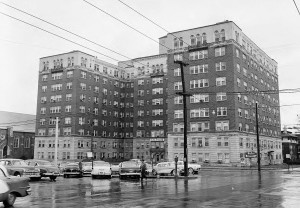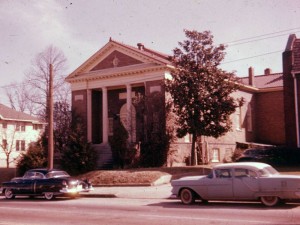Rev. Glenn O. Canfield
Short Bio of Rev. Glenn Owen Canfield
The information below is from the May Memorial Unitarian Universalist Society in Syracuse, New York.
Rev. Glenn Owen Canfield ministry at May Memorial: 1946-1952

Rev. Canfield was our seventh minister. He was born in Topeka, Kansas, in 1907. He was educated at Texas Christian University and then at the McCormick Theological Seminary in Chicago. He became a Presbyterian minister in Woodstock (IL), Tulsa (OK), and Hobbs (NM). He then sought a more free religion and became interested in social reform. He became a Unitarian minister in Clinton and Berlin (MA) in 1945. He became the minister at May Memorial in 1946. In 1951 he became Minister- at-Large in Atlanta, Georgia. He started a racially integrated United Liberal Church in Atlanta in 1954. He was minister of the First Unitarian Church Miami (FL) in 1956. He was Executive Secretary for UUA districts in New England and the Southwest from 1959 to 1969. He died in Tulsa, Oklahoma, in 1973.
Source: May Memorial Unitarian Universalist Society
Rev. Canfield Sermon Style in Atlanta
In a newspaper article in the Atlanta Constitution on May 5, 1952, it was noted that Rev. Canfield brought to Atlanta a lively sermon style that was characterized by a two-hour sermon that included a discussion session, sometimes called a talk-back, with the congregation regarding the sermon topic.
The article also delineated a declaration of principles and that the church welcomes all who share the church’s principles. Those principles are summarized as follows:
- We believe in freedom of research in the continual process of discovering life’s truths and values;
- in the possibility of growth toward maturity – mentally, emotionally and spiritually – as we learn to live in Spiritual Reality of the universe;
- in the relatedness of all mankind, and that happiness and security can be realized only in human relations based upon mutual understanding, co-operation and love.
Rev. Canfield added, “One of the distinctive reasons for the liberal church is people need to know how to live – truly how to live successfully and happily in this confused world.” Rev. Canfield continued that liberals rely on a flexible set of principles and not on a set creed. Freed from having to adhere to a set creed, liberals were not dependent on the Bible to define their religious beliefs. Rather liberal can arrive at their own decision about the core of their religious truth.
Religious services where conducted in the Briarcliff Hotel.
Source: The Atlanta Constitution, Pastor’s Sermon Debated By New Congregation, May 5, 1952, Page 9
Meeting and Leaving Briarcliff Hotel

While services were being held at the Briarcliff Hotel, Rev. Canfield recalled that he had a discussion with the hotel manager regarding people entering the hotel for services.
Adults entered the meeting room directly from the street, but the children entered through the main lobby. Since services were integrated, Black children were entering the hotel via the main lobby.
Although the hotel manager was sympathetic, the manager indicated that the hotel was a public place. Even though there was no law forbidding Black children entering the main lobby, the manage shared that there were social and political pressures that had to be considered. He opined that the hotel could be vulnerable to attack by prejudiced people who were determined to preserve segregation and to “keep the nigger in his place.”
The hotel manager feared that if the hotel owner discovered the situation at the hotel that he could lose his job and possibly never find another job in the hotel industry.
Rev. Canfield said, “Well, then, it looks like we just can’t have them.”
The hotel manager relied, “I would not put it as blunt as that. I will say that I would rather they would not come.”
Canfield knowing a truly liberal church would not exclude Blacks from its services determined that it would be necessary to find alternate meeting space.
Source: Southern Witness: Unitarian and Universalists in the Civil Rights Era, by Gordon Davis Gibson, Published by Skinner House Books, copyright 2015, page 70
Alternate meeting location after Briarcliff hotel

605 Boulevard, NE
Rev. Canfield and others worked diligently to find an alternate meeting space. In October 1952, the Unitarians and Universalists began negotiations with the Latter-Day Saints to share their current worship space at 605 Boulevard, NE.
Negotiations intensive in In January 1953, when the Briarcliff Hotel informed Rev. Canfield that another tenant would occupy their current meeting space effective February 2.
Rev. Canfield, however, happily reported that, “The Liberals and Mormons have reached complete and amicable agreement! At least on some things.”
The Mormons were in the process of erecting a new building in the 1400 block of Ponce de Leon. While the building was under construction the worship space would be shared by the two denominations.
By April 1954, the Mormons had vacated their old worship space and the Unitarians and Universalists took control of both the worship space at 605 Boulevard, NE and the parsonage at 489 North Avenue, NE.
Source: Southern Witness: Unitarian and Universalists in the Civil Rights Era, by Gordon Davis Gibson, Published by Skinner House Books, copyright 2015, page 71
Source: The Atlanta Constitution, United Liberal Church Buys 2 Buildings, April 26, 1954, Page 22